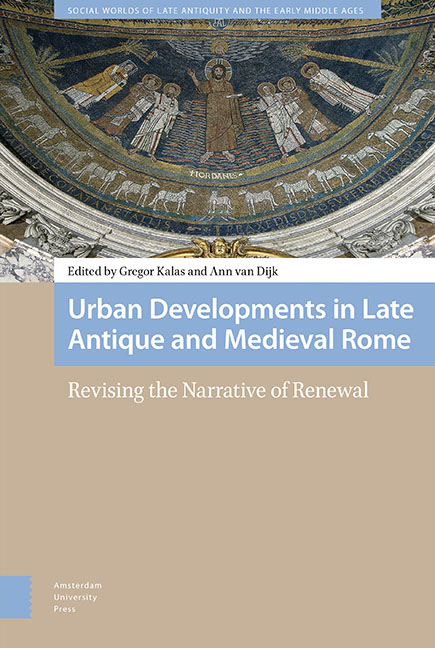Book contents
- Frontmatter
- Contents
- Preface and Acknowledgments
- List of Abbreviations
- 1 Introduction: Revising the Narrative of Renewal for Late Antique and Medieval Rome
- 2 Rome at War: The Effects of Crisis on Church and Community in Late Antiquity
- 3 Portraits of Poets and the Lecture Halls in the Forum of Trajan : Masking Cultural Tensions in Late Antique Rome
- 4 Rolling Out the Red Carpet, Roman-Style : The Arrival at Rome From Constantine to Charlemagne
- 5 (Re-)Founding Christian Rome: The Honorian Project of the Early Seventh Century
- 6 After Antiquity: Renewing the Past or Celebrating the Present? Early Medieval Apse Mosaics in Rome
- 7 The Re-Invention of Rome in the Early Middle Ages
- 8 Rewriting the Renouveau
- 9 Renewal, Heritage, and Exchange in Eleventh-Century Roman Chant Traditions
- 10 Reforming Readers, Reforming Texts: The Making of Discursive Community in Gregorian Rome
- Manuscripts Cited
- Index
2 - Rome at War: The Effects of Crisis on Church and Community in Late Antiquity
Published online by Cambridge University Press: 18 June 2021
- Frontmatter
- Contents
- Preface and Acknowledgments
- List of Abbreviations
- 1 Introduction: Revising the Narrative of Renewal for Late Antique and Medieval Rome
- 2 Rome at War: The Effects of Crisis on Church and Community in Late Antiquity
- 3 Portraits of Poets and the Lecture Halls in the Forum of Trajan : Masking Cultural Tensions in Late Antique Rome
- 4 Rolling Out the Red Carpet, Roman-Style : The Arrival at Rome From Constantine to Charlemagne
- 5 (Re-)Founding Christian Rome: The Honorian Project of the Early Seventh Century
- 6 After Antiquity: Renewing the Past or Celebrating the Present? Early Medieval Apse Mosaics in Rome
- 7 The Re-Invention of Rome in the Early Middle Ages
- 8 Rewriting the Renouveau
- 9 Renewal, Heritage, and Exchange in Eleventh-Century Roman Chant Traditions
- 10 Reforming Readers, Reforming Texts: The Making of Discursive Community in Gregorian Rome
- Manuscripts Cited
- Index
Summary
Abstract
This chapter explores ecclesiastical responses to the military and subsistence crises that directly impacted Italy, and the city of Rome, during the later fifth and sixth centuries. It examines how a series of events, such as the civil war in 489–493 between the barbarian warlords Odoacer and Theoderic, the Gothic War from c. 535–554, and regional food shortages shaped the development of the Roman church both culturally and materially. While acknowledging the deleterious impact of these crises on individual bodies and communities, the chapter argues that war and its related effects were essentially generative in nature, offering opportunities for churchmen and laypeople to formulate new ecclesiastical ideals, practices, and spaces.
Keywords: charity, war, refugees, environmental crisis, and food shortages
Introduction
Sometime during his episcopate in the late fifth century, the Roman bishop Gelasius (492–496 CE) sent an impassioned plea to an Italian estate owner and femina illustris named Firmina. Gelasius wanted her to help Rome recover some church property that had been illegally seized during a recent war. ‘But it would most certainly contribute to the total of your reward if the estates which have been stolen either by barbarians or by Romans, to our disadvantage, were handed back by your arrangement for the feeding of the poor,’ he wrote. ‘Such a multitude has converged on Rome from diverse provinces that have been laid waste by the carnage of war, that we are hardly able to satisfy it.’ When Gelasius became bishop in 492, the peninsula was still mired in a devastating conflict between the local forces of Odoacer, who had ruled Italy since 476, and the invading armies of Theoderic, who had been sent by the Emperor Zeno to unseat the barbarian king. From 489 to 493, their armies clashed, mainly in the northern provinces. The war culminated with a lengthy siege of Ravenna, and ended with Odoacer's surrender and death.
Late Roman military conflicts had many far-reaching effects that bishops such as Gelasius witnessed first hand: mass migrations, typically into fortified cities such as Rome, which, like all late ancient cities, were unequipped to deal with what we would call a refugee crisis; food shortages, often triggered by population displacement; epidemic illness, brought on by denser than usual living arrangements and the consumption of rotting food and polluted water; and the disruption of revenue streams, upon which late antique churches relied for maintaining clergy, buildings, and service to the poor.
- Type
- Chapter
- Information
- Urban Developments in Late Antique and Medieval RomeRevising the Narrative of Renewal, pp. 41 - 74Publisher: Amsterdam University PressPrint publication year: 2021



